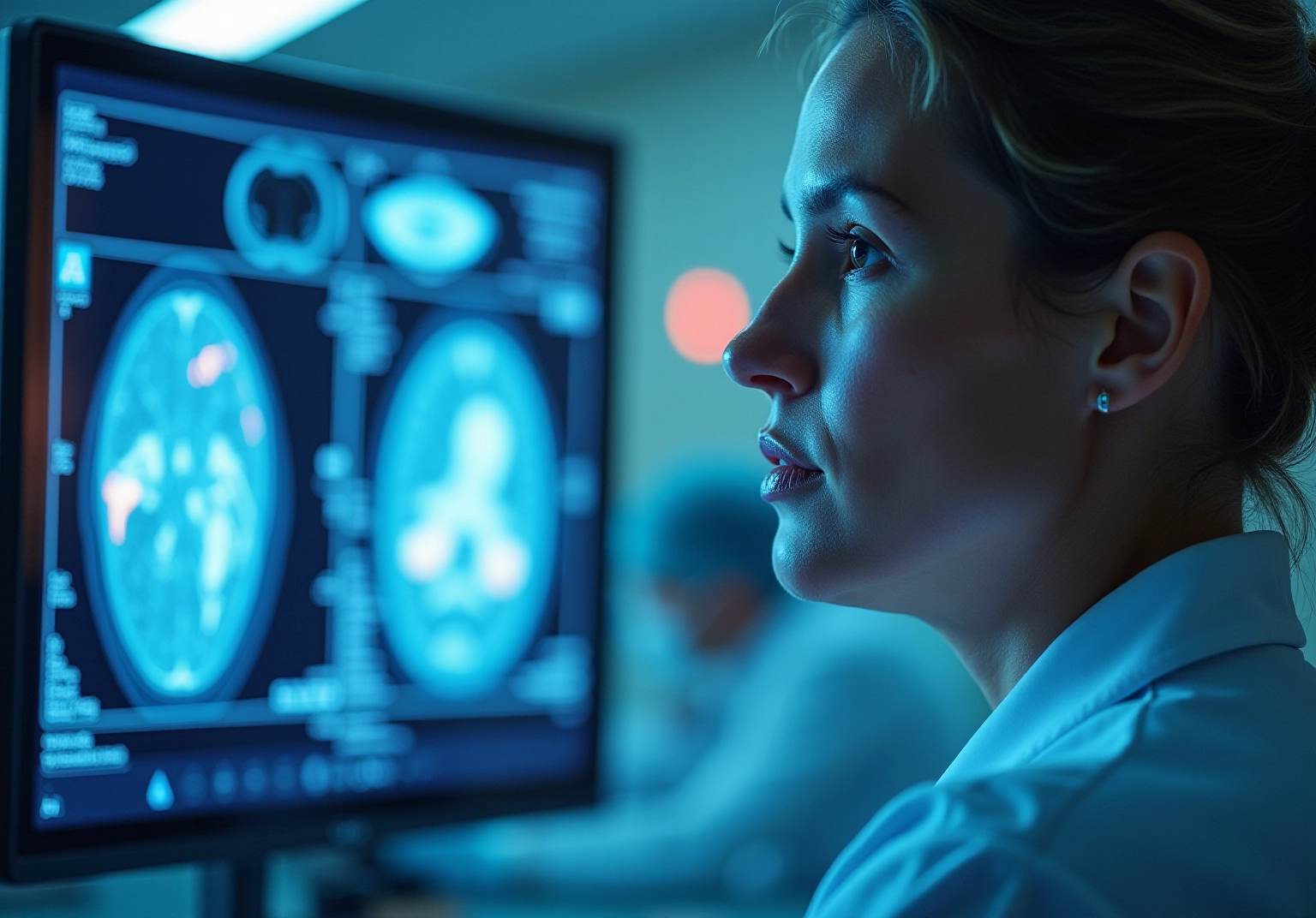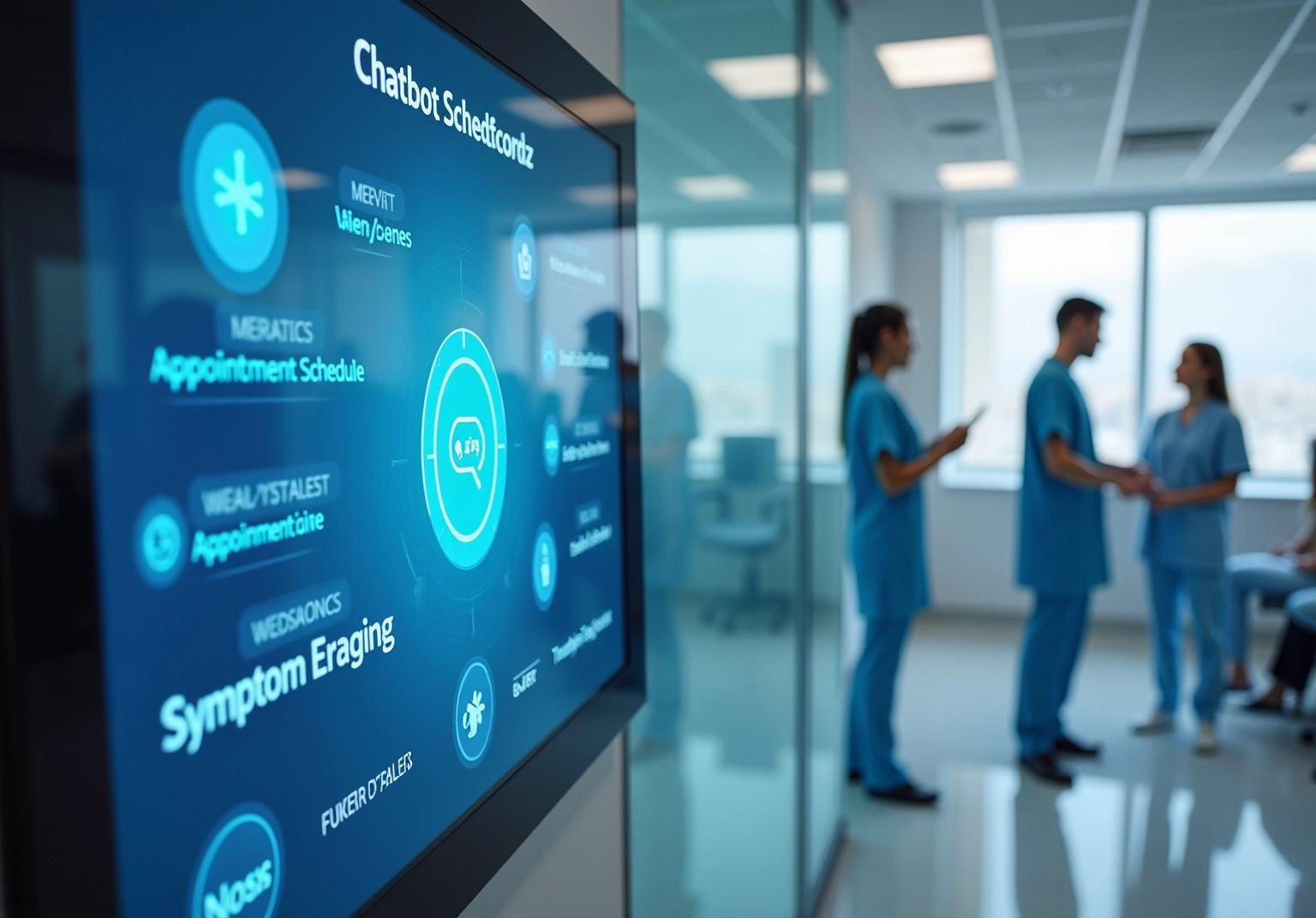
This article presents ten transformative applications of AI in healthcare, which significantly enhance patient outcomes. These applications include:
Each application illustrates how AI optimizes diagnosis, personalizes treatment, increases operational efficiency, and boosts patient engagement. Ultimately, these advancements lead to improved health results and reduced costs within the healthcare system.
The healthcare sector is witnessing a profound transformation, propelled by the integration of artificial intelligence (AI) technologies that are reshaping patient care and operational efficiency. By streamlining administrative tasks and enhancing diagnostic accuracy, AI applications are not merely improving processes; they are fundamentally altering patient outcomes. As healthcare providers confront the complexities of modern medicine, a critical question emerges: how can these innovative AI solutions be leveraged to tackle existing challenges and elevate the standard of care? This exploration delves into ten pivotal applications of AI in healthcare, revealing their potential to revolutionize patient experiences and outcomes.
The Inferscience HCC Assistant addresses a critical challenge in healthcare: the administrative burden associated with HCC coding. This tool automates the coding process using advanced AI algorithms, showcasing the applications of AI in health care and significantly alleviating the workload on healthcare providers. By conducting real-time gap analysis on claims data and offering coding suggestions grounded in clinical information and historical billing practices, it guarantees enhanced accuracy and compliance with Medicare regulations.
This innovative solution not only streamlines workflows but also positively impacts Risk Adjustment Factor (RAF) scores, ultimately maximizing funding opportunities from Medicare Advantage enrollees. Furthermore, the comprehensive submission of all relevant codes provides both plans and Medicare with a clearer understanding of individual patient conditions and anticipated medical expenses.
By incorporating Natural Language Processing (NLP) tools, the Inferscience HCC Assistant effectively consolidates client information, which demonstrates the applications of AI in health care by addressing the inaccuracies that often arise from information silos. This functionality allows medical providers to focus more on delivering care to individuals rather than getting bogged down by administrative tasks. The result is a marked improvement in the precision of HCC coding and superior outcomes for patients receiving care.

The applications of AI in health care, such as predictive analytics, harness historical individual data to foresee potential health issues, empowering healthcare providers to act proactively. By scrutinizing patterns and trends, these models can pinpoint individuals at risk and recommend tailored treatment plans. This proactive strategy not only enhances health outcomes but also mitigates the risk of expensive hospitalizations.
In the realm of chronic disease management, for instance, the applications of AI in health care, such as predictive analytics, can anticipate exacerbations, facilitating timely adjustments to treatment protocols. This capability is vital as medical systems increasingly adopt value-driven approaches focused on improving quality of life and fostering patient engagement.
The integration of predictive analytics into clinical workflows demonstrates the applications of AI in health care, with studies indicating that early interventions can lead to significant reductions in hospital readmissions and overall medical costs. As the medical field continues to advance, the significance of predictive analytics will be paramount in developing effective, individualized treatment strategies.
The applications of AI in health care through telemedicine solutions are revolutionizing medical service delivery, particularly in remote and underserved areas. By leveraging advanced AI algorithms, these platforms efficiently assess individuals, analyze symptoms, and provide prompt treatment recommendations. This capability not only enhances user engagement but also optimizes resource distribution within healthcare systems, effectively addressing the limitations of conventional EMRs that often lack essential clinical knowledge and data interpretation support.
For instance, AI facilitates effective appointment scheduling and follow-up management, ensuring individuals receive timely assistance without unnecessary delays. The integration of AI in telemedicine significantly enhances individual satisfaction and reduces wait times, ultimately leading to improved health outcomes.
As healthcare providers increasingly adopt these technologies, the applications of AI in health care to bridge gaps in service access become increasingly apparent, establishing it as a vital component of modern healthcare strategies. Furthermore, Inferscience’s Infera solution empowers group medical practices by offering robust clinical knowledge and data interpretation support, which enhances evidence-based management of individuals.
With its Clinical Rules Engine, Infera generates multiple scenarios for over 90 conditions, aiding clinicians in staying updated on the latest treatment guidelines and improving patient care. The anticipated economic advantages of applications of AI in health care, with projections to contribute $150 billion to the USA economy by 2026, underscore the broader implications of AI integration within medical systems.

The applications of AI in health care, especially in medical imaging, are fundamentally transforming diagnostics by significantly improving both the accuracy and speed of image analysis. Machine learning algorithms excel at identifying intricate patterns in imaging information that may elude human detection, facilitating earlier identification of conditions such as tumors and fractures. For instance, AI systems analyzing MRI scans can provide radiologists with critical insights, enhancing diagnostic confidence and informing treatment decisions. This advancement not only enhances patient care but also improves workflow efficiency for medical providers.
Recent studies indicate that AI-based imaging achieves a pooled sensitivity of 94.6% and specificity of 93.6% in lung cancer detection, underscoring its potential to revolutionize early diagnosis. With approximately 2.2 million new lung cancer cases and 1.8 million deaths recorded in 2020, the urgency for early detection is paramount. AI’s ability to process millions of data points in seconds allows for rapid assessments, which is crucial in high-demand environments.
Furthermore, the economic advantages of AI implementation in medical services could result in potential savings of $200-360 billion, further enhancing its value proposition. As AI continues to advance, the applications of AI in health care promise to enhance diagnostic accuracy and improve outcomes for individuals across various medical conditions.

Natural Language Processing (NLP) is a transformative tool that demonstrates the applications of AI in health care by enabling healthcare professionals to extract actionable insights from unstructured information, such as clinical notes and discharge summaries. By automating the analysis of this data, NLP tools can identify essential information that supports clinical decision-making and enhances the wellbeing of individuals, reflecting the applications of AI in health care. For instance, NLP can recognize patterns in individual symptoms or treatment responses, which aids in the formulation of tailored support plans. This capability not only elevates the quality of care but also ensures compliance with documentation requirements, ultimately leading to improved patient outcomes through the applications of AI in health care.
Studies demonstrate that the applications of AI in health care, particularly integrating NLP into clinical workflows, significantly enhance decision-making accuracy. Predictive models utilizing NLP-derived keywords achieve an impressive area under the curve (AUC) of 0.922. Furthermore, the applications of AI in health care, especially through NLP-driven tools, streamline the extraction of insights from extensive collections of clinical information, empowering healthcare professionals to make informed decisions swiftly and efficiently. Notably, 80% of medical information remains unstructured and untapped after generation, underscoring the critical role of applications of AI in health care, particularly in utilizing NLP to convert this data into actionable insights.
As Shreyanth S. aptly observes, “NLP methods are vital for extracting valuable information and generating summaries from unstructured clinical literature,” emphasizing the essential function of NLP in enhancing data analysis related to individuals. Additionally, by addressing service gaps—instances where individuals have not received necessary checks or screenings—NLP can enhance the applications of AI in health care, improving Hierarchical Condition Category (HCC) coding accuracy and compliance. This improvement is particularly crucial, as insufficient documentation in HCC coding can lead to significant challenges in risk adjustment processes, ultimately affecting care for individuals in Medicare Advantage.
The applications of AI in health care are revolutionizing user interaction by providing uninterrupted access to medical information and assistance. The applications of AI in health care enable these sophisticated systems to facilitate appointment scheduling, address common inquiries, and issue medication reminders, significantly enhancing the experience for those receiving care. By streamlining communication, chatbots alleviate the administrative burden on medical providers, allowing them to focus more on client support.
For instance, the applications of AI in health care include chatbots that can triage symptoms and direct patients to the appropriate level of care, ensuring timely interventions. Recent research indicates that AI chatbots enhance operational efficiency by automating repetitive tasks, enabling medical professionals to concentrate on more critical responsibilities.
Nonetheless, it is crucial to recognize potential challenges, such as data privacy concerns and the risk of users becoming overly dependent on these technologies. Furthermore, integrating chatbots with electronic health records (EHRs) is vital for optimizing medical workflows. Ongoing clinical trials are investigating the applications of AI in health care, focusing on the evolving role of AI chatbots and their potential to further improve engagement and outcomes.

The applications of AI in health care, such as AI-enhanced robotic surgery, are fundamentally transforming the surgical landscape by equipping surgeons with advanced tools that significantly improve precision and reduce recovery times. These sophisticated systems play a crucial role in intricate procedures by offering real-time feedback and support, enabling minimally invasive techniques that promote faster recovery.
Notably, AI algorithms can automate specific surgical tasks; for example, methods for steerable needles achieve an average targeting error of 1.34 ± 0.52 mm in position and 3.16° ± 1.06° in orientation. This effectively minimizes the risk of human error and enhances overall surgical outcomes.
Research indicates that individuals undergoing robotic-assisted surgeries experience recovery durations that are approximately 20% quicker than those using conventional techniques. Furthermore, 57.1% of studies have observed reduced surgery times alongside an increase in the frequency of neurosurgical robot procedures.
Surgeons have reported that the applications of AI in health care, including AI-enhanced instruments, not only optimize workflows but also enhance the precision of surgical procedures, resulting in improved outcomes for patients. This advancement in surgical technology not only benefits individuals receiving treatment but also empowers healthcare providers to deliver high-quality care efficiently.

The applications of AI in health care are fundamentally transforming drug discovery by streamlining the identification of potential therapeutic compounds and predicting their efficacy. This shift addresses the pressing challenges of inefficiencies in drug development, highlighting the applications of AI in health care, where traditional methods often fall short. The applications of AI in health care are evident as machine learning algorithms analyze vast datasets to uncover patterns that inform drug development, significantly reducing the time and costs associated with bringing new medications to market. For instance, the applications of AI in health care assist in predicting how different compounds will interact with biological systems, leading to more targeted and effective treatments.
This acceleration in drug development not only benefits pharmaceutical firms but also improves access to innovative therapies for individuals. With projections indicating that the applications of AI in health care can reduce research and development costs by up to 40%, the pharmaceutical sector stands to gain substantial financial advantages while simultaneously enhancing patient outcomes. Furthermore, 95% of pharmaceutical companies are investing in AI capabilities, acknowledging the applications of AI in health care and its potential to revolutionize the industry.
As AI continues to advance, it is anticipated that the applications of AI in health care may lead to the discovery of 70% of new medications by 2030, underscoring the technology’s essential role in shaping the future of medicine. As the WHO states, “AI is no longer a distant dream but a growing reality shaping the future of medicine.” This reality presents a compelling call to action for stakeholders in the pharmaceutical field to embrace the applications of AI in health care and recognize its transformative potential.

The applications of AI in health care are revolutionizing population health management by enabling medical organizations to analyze extensive datasets and identify high-risk groups. By leveraging predictive analytics, providers can identify patients at risk for chronic diseases, facilitating proactive outreach initiatives tailored to specific health needs.
For instance, predictive models have demonstrated the ability to forecast hospital readmissions, allowing medical systems to implement targeted interventions that significantly reduce these occurrences. This strategic approach not only enhances individual health outcomes but also fosters improved community health by addressing disparities and ensuring equitable access to services.
As healthcare organizations increasingly embrace the applications of AI in health care, the potential for personalized treatment and optimized resource allocation becomes more evident, ultimately resulting in healthier populations and decreased healthcare costs.

The applications of AI in health care are revolutionizing mental health care by equipping professionals with advanced tools that enhance both diagnosis and treatment personalization. Machine learning algorithms analyze vast health data to uncover patterns indicative of mental health conditions, facilitating earlier and more accurate diagnoses. A systematic review of AI chatbots, for instance, demonstrated their effectiveness in promoting health behavior changes, with sample sizes ranging from 920 to over 991,000 participants, showcasing the scalability of the applications of AI in health care. Notably, AI-based conversational agents can reduce symptoms of depression with a Hedge’s g of 0.64, indicating a significant reduction in symptoms compared to control groups.
Moreover, the applications of AI in health care provide customized treatment suggestions tailored to unique individual profiles, significantly enhancing adherence and outcomes. These instruments can track individual progress and dynamically modify treatment plans in real-time, ensuring that support remains aligned with each person’s evolving needs. Eleos Health’s technology exemplifies this, achieving three to four times improved outcomes, underscoring the effectiveness of AI in enhancing results for individuals.
Furthermore, the applications of AI in health care, demonstrated by the AI-enabled self-referral tool, have resulted in a 15% increase in total referrals and a 31% increase among ethnic minority individuals, highlighting AI’s broader impact on accessibility and engagement in mental health services. Mental health professionals recognize the potential of AI tools to augment their capabilities, with one expert stating that AI will not replace humans but will empower those who utilize it effectively. As AI continues to evolve, its integration into mental health care promises to significantly enhance the quality of care and patient outcomes, including the ability to predict suicide attempts with high accuracy.
The integration of artificial intelligence in healthcare is not just reshaping patient outcomes; it is fundamentally transforming the landscape of medical practice. By leveraging AI technologies, healthcare providers can enhance efficiency, improve diagnostic accuracy, and deliver personalized care. This evolution leads to better health outcomes for individuals, making AI applications essential tools in modern healthcare delivery.
Throughout this discussion, we have explored various applications of AI, including:
Each innovation contributes to a more proactive and efficient healthcare system, effectively addressing challenges such as administrative burdens, diagnostic errors, and treatment delays. Moreover, AI’s role in drug discovery and mental health care highlights its potential to accelerate therapeutic advancements and enhance patient engagement.
As the healthcare sector continues to evolve, embracing AI technologies is imperative for improving patient care. Stakeholders across the industry—providers, researchers, and policymakers—must recognize and invest in the transformative potential of AI. By doing so, they can enhance operational efficiencies and ensure that quality care is accessible to all, paving the way for a healthier future.